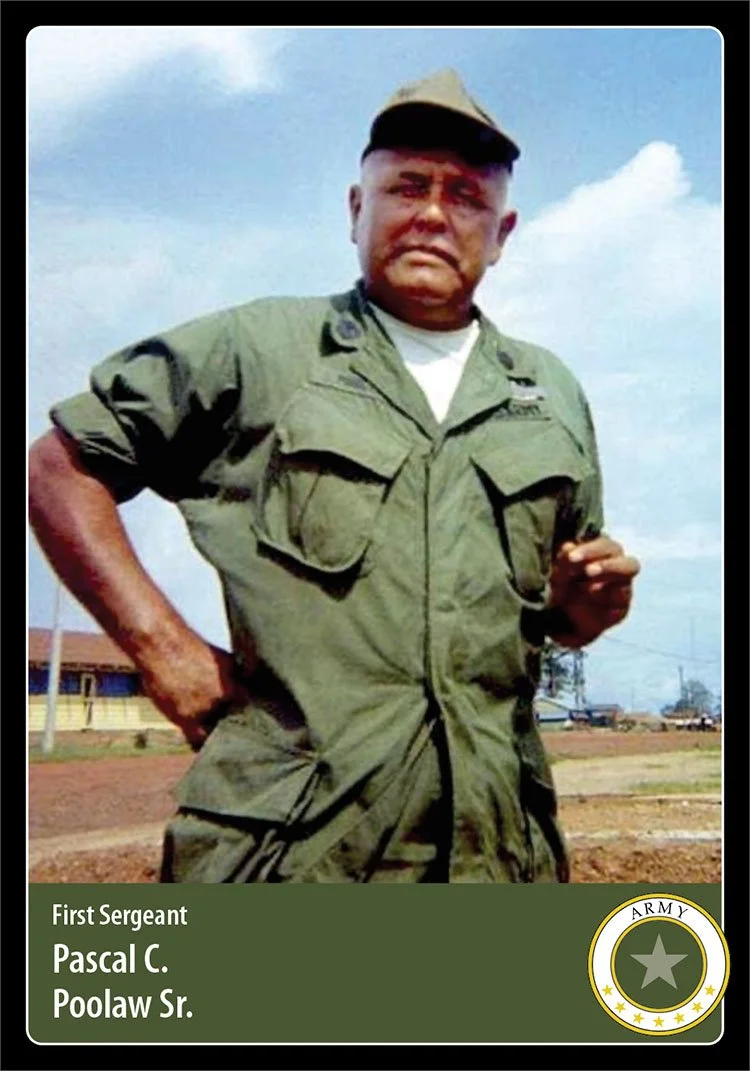Hero Card 38, Card Pack 4
Photo from Vietnam Veterans Memorial Fund: The Wall of Faces
Hometown: Apache, OK
Branch: U.S. Army
Unit: Company C, 26th Infantry Regiment, 1st Infantry Division
Military Honors: 4 Silver Stars, 5 Bronze Stars, 3 Purple Hearts, Distinguished Service Cross
Date of Sacrifice: November 7, 1967 - KIA near Loc Ninh, Vietnam
Age: 45
Conflict: Vietnam War, 1959-1975
A full-blooded Kiowa from Oklahoma, Sgt. Pascal Cleatus Poolaw Sr. is the most decorated Native American soldier in U.S. history, having earned 42 medals, badges, citations, and campaign ribbons for combat service and for valor. His list of honors includes four Silver Stars, five Bronze Stars, three Purple Hearts, and the Distinguished Service Cross.
Sgt. Poolaw served his country in combat during World War II (1939-1945), the Korean War (1950-1953), and the Vietnam War (1959-1975). He was wounded in all three conflicts.
After serving with distinction in WW II and Korea, Poolaw officially retired from the Army in 1962. Five years later, he re-entered the military in hopes of keeping his son Lindy from having to go to Vietnam. Army regulations prohibited two members of the same family from serving in a combat zone (without their consent). One of Sgt. Poolaw’s other sons, Pascal Poolaw, Jr., had already lost a leg in an explosion while serving in Vietnam. Each of Sgt. Poolaw’s four sons entered the Army, three of them going to Vietnam.
Just four months after arriving in Vietnam, Sgt. Pascal C. Poolaw Sr. was killed in action trying to carry a wounded soldier to safety.
His long legacy of bravery and devotion to his country is captured, in part, by his four Silver Star citations:
First Silver Star Citation (WW II)
The President of the United States of America, authorized by Act of Congress July 9, 1918, takes pleasure in presenting the Silver Star to Staff Sergeant Pascal Cleatus Poolaw (ASN: 18131087), United States Army, for gallantry in action against the enemy while serving with Company M, 8th Infantry Regiment, 4th Infantry Division, near Recogne, Belgium, on 8 September 1944. While attacking in support of a rifle company, Sergeant Poolaw displaced his machine gun squad forward across an open field under heavy mortar and small arms fire in such a manner as to affect a minimum number of casualties among his squad. After reaching his new position, Sergeant Poolaw saw the enemy advance in a strong counterattack. Standing unflinchingly in the face of withering machine gun fire for five minutes, he hurled hand grenades until the enemy force sustained numerous casualties and was dispersed. Due to Sergeant Poolaw’s actions, many of his comrades’ lives were saved and the company was able to continue the attack and capture strongly defended enemy positions. Sergeant Poolaw’s display of courage, aggressive spirit and complete disregard for personal safety are in keeping with the highest traditions of the military service.
Second Silver Star Citation (Korean War)
The President of the United States of America, authorized by Act of Congress, July 9, 1918, takes pleasure in presenting a Bronze Oak Leaf Cluster in lieu of a Second Award of the Silver Star to Sergeant First Class Pascal Cleatus Poolaw (ASN: 18131087), United States Army, for conspicuous gallantry and intrepidity in action while serving with Company C, 27th Infantry Regiment, 25th Infantry Division. On 19 September 1950 when the company attack on an enemy position was halted by stiff enemy resistance, Sergeant First Class Poolaw volunteered to lead his squad in an assault. Courageously leading his men in a charge up the slope to penetrate the enemy perimeter and engage the numerically superior enemy in fierce hand-to-hand combat, Sergeant First Class Poolaw inspired his men to hold their position until the remainder of the company was able to seize the objective. Sergeant First Class Poolaw’s outstanding leadership reflects great credit upon himself and is in keeping with the highest traditions of the American Soldier.
Third Silver Star Citation (Korean War)
The President of the United States of America, authorized by Act of Congress, July 9, 1918, takes pleasure in presenting a Second Bronze Oak Leaf Cluster in lieu of a Third Award of the Silver Star to Master Sergeant Pascal Cleatus Poolaw (ASN: 18131087), United States Army, for conspicuous gallantry and intrepidity in action while serving with Company C, 27th Infantry Regiment, 25th Infantry Division. On 4 April 1951 near Chongong-ni, Korea, while attacking strong hostile positions, one squad of Master Sergeant Poolaw’s platoon was immobilized by a devastating automatic weapons and mortar barrage. Exposing himself to the deadly fire, he slowly advanced across open terrain, firing his rifle as he progressed. By deliberately diverting the attention of the foe to himself, he enabled his men to maneuver to more advantageous positions. Master Sergeant Poolaw’s valorous actions were instrumental in the fulfillment of the unit mission and are in keeping with the highest traditions of the American Soldier.
Fourth Silver Star Citation (Vietnam War)
The President of the United States of America, authorized by Act of Congress, July 8, 1918 (amended by act of July 25, 1963), takes pride in presenting a Third Bronze Oak Leaf Cluster in lieu of a Fourth Award of the Silver Star (Posthumously) to First Sergeant Pascal Cleatus Poolaw (ASN: 18131087), United States Army, for gallantry in action against a hostile force in the Republic of Vietnam on 7 November 1967, while serving with Company C, 26th Infantry Regiment, 1st Infantry Division. On this date, during Operation SHENANDOAH II, First Sergeant Poolaw was accompanying his unit on a two-company search and destroy mission near Loc Ninh. As the patrol was moving through a rubber plantation, they were subjected to sniper fire. Within minutes, the area was raked with intensive claymore mine, rocket, small arms, and automatic weapons fire from a numerically superior Viet Cong force. First Sergeant Poolaw unhesitatingly ran to the lead squad which was receiving the brunt of the enemy fire. With complete disregard for his personal safety, he exposed himself to assist in deploying the men and establishing an effective base of fire. Although wounded, he continued to move about the area encouraging his men and pulling casualties to cover. He was assisting a wounded man to safety when he was mortally wounded by Viet Cong fire. His dynamic leadership and exemplary courage contributed significantly to the successful deployment of the lead squad and undoubtedly saved the lives of many of his fellow soldiers. First Sergeant Poolaw’s unquestionable valor in close combat against numerically superior hostile forces is in keeping with the finest traditions of the military service and reflects great credit upon himself, the 1st Infantry Division, and the United States Army.
Poolaw Hall at the U.S. Army base in Fort Sill in Lawton, Oklahoma—where Sgt. Poolaw was stationed before his deployment to Vietnam—is named in his honor. He is also honored on panel 29e, line 43 of the Vietnam Veterans Memorial wall in Washington, D.C.
Sgt. Poolaw’s wife Irene spoke at his funeral: “He has followed the trail of the great chiefs,” she said. “His people hold him in honor and highest esteem. He has given his life for the people and the country he loved so much.”
Sources
Card photo from Vietnam Veterans Memorial Fund: The Wall of Faces
Army.mil Features: Pascal C. Poolaw Sr. 1967: Most Decorated American Indian Soldier
Vietnam Veterans Memorial Fund: The Wall of Faces
The National Gold Star Family Registry: FSGT Pascal Cleatus Poolaw Sr.
National Native American Hall of Fame 2019 Inductee: Pascal Poolaw, Kiowa Tribe
PBS: The Warrior Tradition
Burial Site: Find a Grave





